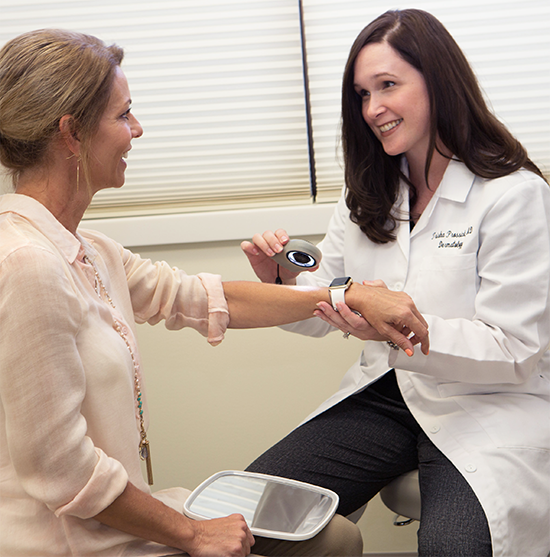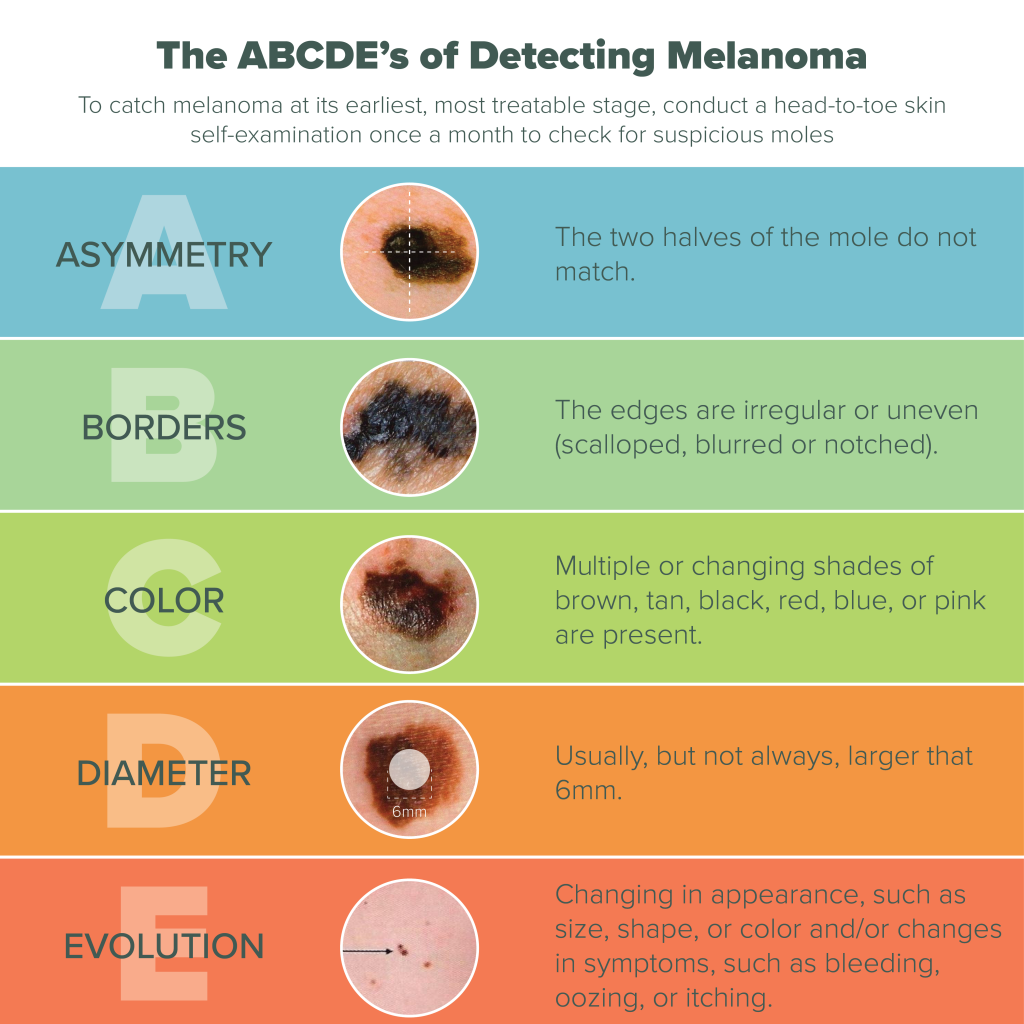
SKIN CANCER: WHAT YOU NEED TO KNOW
If you haven’t had your body examined from head-to-toe for any suspicious moles, lesions or spots before, now is the right time to do so. Here’s everything you need to know about skin cancer screenings, how to give yourself a skin check and a few other tips on how to keep the largest organ in your body—your skin—safe.
But First, What Is Skin Cancer?
Of the thousands of types of cancer diagnoses, the most common is skin cancer. It’s estimated that between 40 and 50 percent of Americans who live to age 65 will have either basal cell carcinoma or squamous cell carcinoma at least once. In simple terms, skin cancer is the uncontrolled growth of abnormal cells and it happens when unrepaired DNA damage to skin cells triggers mutations. Though you can experience skin cancer anywhere on your body, the areas that receive the most exposure to sunlight—like your scalp, face, shoulders and chest—are more at risk than say, your underarms.
What Are the Types of Skin Cancer?
There are numerous of types of skin cancer, all with varying degrees of severity and frequency, but the most common forms are basal cell carcinoma, squamous cell carcinoma, and melanoma. Here is a brief look at each:
1. Basal Cell Carcinoma
There are more than four million cases of basal cell carcinomas (BCC) each year in the United States, making it the most common type of skin cancer. BCC arises from your epidermis, which is the outer layer of your skin and is typically slow-growing. Though often easier to treat than other forms, if left undiagnosed/untreated, the result can be catastrophic. When you’re on the lookout for possible BCC spots, be sure to look for a pearly appearance and take special note if the area starts to bleed. If a freckle, mole or spot changes over a few months, see your dermatologist right away.
2. Squamous Cell Carcinoma
This type of cancer also arises from the outer layer of skin but is more aggressive than BCC. Instead of a pearly appearance, SCC often has a scaly, elevated and red look you can feel when you brush against the area with your hand. If you notice a brown freckle changing to this type of texture and color, make sure to alert your dermatologist and take notes of the transformation over time.
3. Melanoma
As the most severe of type of cancer, melanoma, demands your immediate attention. if you see any spot that could be consistent with this diagnosis. For melanoma, dermatologists recommend following the ABCDE guide (below) for checking a mole, with each letter representing a different quality to investigate.

What to expect during a skin cancer screening
- What should I wear? While it is ultimately your choice, you will be encouraged to remove clothing except for underwear. Women will be asked to remove bras. Patients will be provided with modesty drapes and vests when applicable. When possible please remove nail polish and make-up.
- Why shouldn’t I ask about my other skin concerns (e.g. rash, warts, hair loss, nail fungus, acne, etc) during my screening examination? Our priority during a screening examination is to focus on looking for signs of skin cancer and educating our patients about the same. The attention of your dermatologist is diverted away from the top priority if you bring up unrelated skin concerns. This may lead to missed or misunderstood diagnoses. Please schedule a separate appointment to discuss concerns unrelated to your screening examination.
- When should I start coming in for screening examinations? There is no set answer that applies to all patients. We are always happy to see patients at any point in life for a screening exam and will make recommendations for future screening based on individual risk factors. You should definitely consider a screening exam if: you have skin that burns easily, blue eyes, family members with skin cancer, past or current tanning bed use, past or current regular sun exposure, lots of moles or freckles.
- What if I need a biopsy? Biopsies are generally quite simple and quick. Most patients report very little, if any, discomfort during a biopsy and are pleasantly surprised by the simplicity of the process. When at all possible we perform biopsy(ies) at the time of initial screening.
how to give yourself a skin check at home
Watch this short video by the American Academy of Dermatology to learn how to do an at-home skin cancer screening (mole check) in between visits to the dermatologist.
how to protect yourself from skin cancer
1. Stay Out of the Sun at Peak Times
Avoiding the sun during its hottest hours—between 10 a.m. and 2 p.m.—is recommended to avoid damage.
2. Use Sunscreen With at Least an SPF of 30
Toss out that SPF 15 and opt for a more effective barrier between you and the sun. Choose SPF 30, 50 or 100. The recommended amount of sunscreen to use is 1 oz.—the size of a shot—every two hours to cover their body.
3. Use Protective Eyewear and Clothing
For an additional shield against the sun, invest in UV-protective sunglasses to keep your eyes safe (you can get skin cancer in your eyes) and sun-protective clothing with UPF, including shirts, hats and more.
Want a little more information? Watch this short video by the American Academy of Dermatology to learn more about ways to protect yourself from sun damage and skin cancer.
Get In Touch
JoCo Dermatology
151 West 151st Street
Olathe, KS 66061

